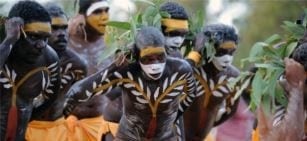Home / Our Regions / North-East Arnhem Land
The north-east Arnhem Land region is located in the north-eastern corner of the Northern Territory, approximately 1,050 kilometres from Darwin. This vast tract of nearly 100,000 square kilometres of Aboriginal-owned land is one of the last strongholds in Australia of a vibrant traditional Aboriginal culture.
The Aboriginal people of north-east Arnhem Land, the Yolngu, today live a unique lifestyle with a strong cultural focus, despite ongoing constant pressure to conform to a western lifestyle. Land and country are genetically factored into the DNA of all Yolngu people. The Yolngu have lived in the region for at least 50,000 years, with recognised land and sea estates. Many Yolngu live in small communities on the traditional homelands of 13 different clan groups—the number reflects the richness and diversity of our culture. Yolngu matha is spoken as the first language in a typical Yolngu home but there are more than 40 Yolngu languages across the region. English is the second or third spoken language.
North-east Arnhem Land, including the Gove Peninsula, is part of the Arnhem Land Aboriginal Land Trust, and is held under inalienable freehold title by the Northern Land Council on behalf of the traditional land owners. The township of Nhulunbuy and the associated Rio Tinto Alcan bauxite mining operation are on lease areas. Yirrkala, some 15 kilometres south-east of Nhulunbuy with approximately 800 people, is the largest Yolngu community on the peninsula. The region’s economy faces uncertain times given the current curtailment of the bauxite refinery.
The Dilak Authority (comprising our 13 Yolngu clan nations) has long operated as our system of governance, but is not recognised outside our traditional world. In order to achieve effective Indigenous policy reform, government must hear that Yolngu people are requesting responsibility to determine our own future.
Yolngu do not exist in their own society in the same way as non-Indigenous people do. The two worlds need to find a balance of both influences to make reform effective.
Image credits: Garma © Yothu Yindi Foundation
“It is through the ceremonies that our lives are created. These ceremonies record and pass on the laws that give us ownership of the land and of the seas, and the rules by which we live. Our ceremonial grounds are our universities, where we gain the knowledge that we need. We travel the song cycles that guide the life and the essence of the clans - keeping all in balance, giving our people their meaning. It is the only cycle of events that can ever give a Yolngu person the full energy that he or she requires for life. Without this learning, Yolngu can achieve nothing; they are nobody.”
Galarrwuy Yunupingu AM
